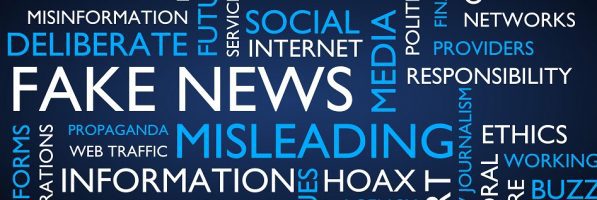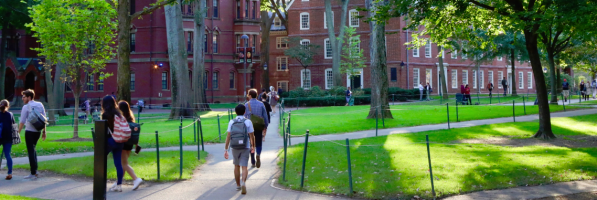Fighting Fake News, Working Mothers, and More – Boston News

Let’s explore some of the most interesting stories that have emerged from Boston business schools this week.
Lazy Thinking, Not Political Bias, Drives Fake News – MIT Sloan Newsroom
MIT Sloan Associate Professor David Rand and the University of Regina’s Gordon Pennycook recently published a new study that illuminates what actually perpetuates fake news—a “lack of analytical thinking.”
Professor Rand writes, “Our study suggests that falling for fake news is a symptom of cognitive laziness rather than motivated reasoning or self-deception. That is, contrary to popular belief, it is not the case that people are thinking too much about the wrong things. Rather, a little thinking might go a long way to fix the problem of fake news.”
In a study that surveyed “3,446 participants to rate the accuracy of headlines from actual news stories from Facebook,” the duo found that “people who engage in more analytic thinking, as measured by the Cognitive Reflection Test, are better at discerning true from false—regardless of identified motivations or political biases.”
You can read more about the research here.
What’s Your Carbon Footprint? You Probably Have No Idea. – D’Amore-McKim Blog
In a recently published study, D’Amore-McKim Professor Amir Grinstein surveyed 1,000 people to “guess the amount of CO2 emitted from burning one gallon of gasoline and the amount of calories in one gallon of whole milk.”
The goal was to “examine people’s knowledge of their own carbon footprint and how they can better educate themselves about the real impact they have on the environment.”
Grinstein believes that in order to change the public’s understanding of its own carbon footprints, they must have a “better understanding of how CO2 emissions play a role in everyday life allows people to decide if they’re willing to step up and change.”
Check out the full article here.
Kids of Working Moms Grow Into Happy Adults – Working Knowledge
New research from Harvard Business School Professor Kathleen McGinn found that, despite the narrative, working mothers often lead to happier and more successful children.
McGinn, the Cahners-Rabb Professor of Business Administration, says, “People still have this belief that when moms are employed, it’s somehow detrimental to their children. So our finding that maternal employment doesn’t affect kids’ happiness in adulthood is really important.”
The preliminary results of McGinn’s work were originally published three years ago, specifically regarding the career success of daughters of working mothers, in contrast to stay-at-home mothers.. When the story reached The New York Times, however, there was some obvious blow-back. McGinn recalls:
“Many decried the research as another installment of the ‘mommy wars.’ But the most common response was from mothers who suffered guilt, self-doubt, and disapproval from others. They found our preliminary results to be welcome news.”
However, McGinn’s research, which was conducted alongside Mayra Ruiz Castro of Kingston University in the UK, and Elizabeth Long Lingo of Worcester Polytechnic Institute, found that the careers of sons of working mothers were not generally effected. Rather, their attitudes were different in contrast to stay-at-home-mothers.
“Sons are influenced in other ways when their moms work. The sons of employed mothers hold significantly more egalitarian gender attitudes—even more so than the daughters of stay-at-home moms, a finding that surprised McGinn because it shows that the influence of maternal employment may even outweigh well-documented sex differences when it comes to shaping people’s mindsets about appropriate roles for men and women.”
You can read more of the ground-breaking research here.
10 Highest GPA Averages in the Business School World

The role of a GPA in MBA admissions is a hotly debated topic among both admissions officers and applicants. How much does it really matter? Does a low GPA destroy your chances of getting into a top business school?
One of the most important things to keep in mind when considering how your undergraduate GPA will impact the MBA admissions process is the fact that not all GPAs are alike. Far from a standardized figure, GPA and the way it’s measured can vary from school to school- even major to major. For this reason, it can be difficult to use the GPA’s of different applicants as any accurate predictor of success.
An student’s GPA will always be an important part of the admissions process, because it helps tell admissions officers about past academic success. Still, admissions officers are well aware of the high level of variability between GPA scores. Taking this into account, most officers working in MBA admissions will always look for more to an individual’s story than just the GPA. Numbers like a GMAT/GRE can often paint a much more exact picture of future academic success than the highly variable GPA. Designed for standardization and to test individuals on the specific challenges of an MBA, a GMAT score allows admissions officials specific insight into each application.
When considering GPA, a general rule of thumb is to not ride or die by this number—whether for better or for worse. A low undergraduate GPA doesn’t necessarily spell disaster for one’s MBA ambitions, and even a perfect 4.0 can’t save an application if the other factors don’t add up.
Overall, the exact number of an undergraduate GPA may be less important than the story behind it. If your low GPA was a result of illness or another external factor while in school, personal statements on the application are a great opportunity to give context behind the numbers and help tell your story to admissions officials.
YOU MAY ALSO LIKE: The Highest Paying MBA Internships You Can Find
Nevertheless, getting a sense of the average undergraduate GPA for your prospective programs can help give provide crucial insights. Class profiles and statistics for business schools throughout the country can give prospective students a good sense of the typical student looks like in each program, and help applicants decide if they’ll be a good fit.
Below, we take a look at the top 10 MBA programs with the highest average undergrad GPA. Take a closer look at these top schools to get an idea of the average student in each program- and your potential future classmates.
10 Highest GPA Averages for MBAs
1. Stanford University Graduate School of Business
The highest GPA average for MBA students in the U.S. belongs to the class at the Stanford University Graduate School of Business. For the Class of 2019, the average undergrad GPA was 3.74. This is down slightly from the school’s 2015 average of 3.75.
2. Harvard Business School
Often jockeying for position with Stanford, HBS took the number two spot this year with an average undergrad GPA score of 3.71. Three years ago, HBS still loomed large with a 3.66 average, and it just keeps getting higher.
3. Haas School of Business – UC Berkeley
Staying on the heels of Harvard, the Haas School of Business at UC Berkeley takes a top spot today with an undergraduate GPA of 3.7. This is a slight increase from the school’s 2015 average of 3.66.

The Haas School of Business GPA average for MBA applicants rose from 3.66 to 3.7 since 2015.
4. Yale School of Management
Significantly up from its GPA average of 3.6 in 2015, the Yale School of Management today has one of the highest undergraduate GPAs in the country at an average of 3.69.
5. Booth School of Business – University of Chicago
The MBA at University of Chicago’s Booth School of Business has consistently maintained one of the top GPA averages for programs in the U.S., up from 3.59 in 2015 to 3.6 this year.
6. The Wharton School – University of Pennsylvania
The Wharton School, consistently recognized for having some of the country’s top business programs, is nothing if not consistent. With a 3.6 average for incoming students between 2012 and 2015, Wharton maintains a perfect 3.6 average GPA this year as well.
7. Kellogg School of Management – Northwestern University
Northwestern’s Kellogg School of Management is another school where consistency is key. From 2014 to today the school has remained at an undergraduate GPA average of 3.6

The average Kellogg undergraduate GPA for MBA students has stayed at 3.6 since 2014.
8. Tuck School of Business – Dartmouth College
The average GPA for incoming students at Dartmouth’s Tuck School of Business has gone up and down throughout the years, but has consistently stayed among the highest in the country- down slightly from 3.52 in 2015 to 3.51 this year.
9. Columbia University – Columbia Business School
The Columbia Business School has always received distinctions as one of the top MBA programs in the country, and their average GPA for incoming students at 3.5—which has stayed the same for more than five years—is no exception.
10. MIT – Sloan School of Management
Typically placing much higher on the list, the average Sloan School of Management at MIT has decreased in recent years, from 3.54 in 2015 to 3.49 for this year’s incoming class. The number nonetheless still remains among the highest average GPAs for MBA programs throughout the country.
Harvard Adcom Director Launches Application Tips Series

Clear Admit recently spoke with Chad Losee, the Managing Director of Admissions and Financial Aid at the Harvard Business School, which you can read in full below.
Clear Admit had the pleasure of sitting down with Harvard Business School Managing Director of Admissions and Financial Aid Chad Losee a few weeks ago when we were in Boston for the annual Graduate Management Admission Council conference. Losee shared then his plans to launch an Application Tips series on his blog. True to his word, he kicked things off earlier this month.
Each week, he plans to tackle a different element of the application, offering suggestions for how to approach it and clearing up any misconceptions applicants may have. “My goal is to demystify the written application and give you some simple, practical suggestions for putting together your story,” he wrote.“When July hits, I know from personal experience that applying starts to feel ‘real’ when you are planning to apply to HBS in Round 1,” he wrote. He’s referring, of course, to his own application process to HBS not all that long ago. (He’s a 2013 graduate of the MBA program.)
Up first, in a July 13 post to his Direct from the Director Blog, he turned his focus to the “Employment History” section of the application. “I think there’s a temptation to just ‘go through the motions’ in this part of the app—maybe because it feels similar to your resume?” he wrote. But doing so means missing a valuable opportunity to help the HBS admissions team really get to know you.
“The employment history section ought to be one of the more self-reflective parts of the application as you step back and take stock of your journey so far,” Losee advised. “Don’t be afraid to show a little personality in your responses!”
This means taking full advantage of the 250-charcter text boxes you’re given to provide details about your most recent three jobs, including your role and responsibilities, company/organization description, reason for leaving, key accomplishments, and most significant challenge.

HBS Managing Director of Admissions and Financial Aid Chad Losee
Use your own words—not an HR job posting or company boilerplate—to explain the most important aspects of your individual role as well as the specific division or team you are a part if you work for a large well-known company. “If you work at a startup or your family business, giving us details beyond what is available online is also very helpful,” he added.
Your reason for leaving can be simple and straightforward. But take the opportunity to “reflect on the ‘why’ of a key transition in your work life,” Losee continued. And do more than simply list key accomplishments or significant challenges—communicate why they were meaningful to you.
Losee will zero in on the essay portion of the application in his next post in the series, followed by recommendations, standardized tests/transcripts, awards/extracurriculars, and résumé.
We think it’s great that he’s taking the time to demystify the HBS admissions process. If you’re gearing up to apply, you certainly don’t want to miss out on what he shared. We’ll capture the essence of his subsequent posts in recaps here, but you can also visit his blog yourself. HBS will also share the tips via Instagram, so if that’s more your jam, you can follow along at @hbsadmissions.
Losee did confess to one hesitation at the outset of the series, namely that applicants might try to follow his suggestions too closely. “The written app is for you to introduce yourself—we designed a lot of ‘space’ in the app for you to tell your story,” he stressed. “If you’re following a rote/cookie-cutter approach we won’t be able to get to know you. So, promise you won’t do that?”
The new “Application Tips” series complements other scheduled HBS events and webinars—be sure to add those to your calendar as well.
Can Society Keep Up with Tech Entrepreneurs? – Boston News

Let’s explore some of the most interesting stories that have emerged from Boston business schools this week.
When Technology Gets Ahead of Society – Harvard Business Review
The Harvard Business Review recently dove into work by professor and Harvard‘s Lakshmi Mittal South Asia Institute Director Tarun Khanna that examines tech entrepreneurs’ “insouciance about the legal and social issues their innovations birth.”
Khanna explains that one pervasive issue we are collectively trying to negotiate is that necessary “regulatory, logistical, and social barriers” often struggle to keep pace with new and increasingly disruptive technologies.
“Although electric cars are subsidized by the federal government, Tesla has run afoul of state and local regulations because it bypasses conventional dealers to sell directly to consumers. Facebook is only now facing up to major regulatory concerns about its use of data, despite being massively successful with users and advertisers.”
Khanna argues that instead of shortening the “period between the advent of a technology and the emergence of the rules and new behaviors that allow society to embrace its possibilities,” Khanna encourages tech leaders to “take more responsibility for the whole ecosystem and bring regulators and consumers along with them, all of society stands to benefit.”
You can check out the full article here.
Machine Learning Will Redesign, Not Replace, Work – MIT Sloan Newsroom
MIT Sloan’s Erik Brynjolfsson, Carnegie Mellon’s Tom Mitchell, and Daniel Rock, a doctoral candidate and researcher at the MIT Initiative on the Digital Economy, published new research in the American Economic Association Papers and Proceedings, which finds that automation will most likely replace “specific tasks within jobs, rather than entire occupations themselves.”
Brynjolfsson writes, for instance, about deep neural networks that are adept at “tasks involving predictive analytics, speech and image recognition, and natural language processing, among others.”
The researchers write, “Automation technologies have historically been the key driver of increased industrial productivity. They have also disrupted employment and the wage structure systematically.”
“However, our analysis suggests that machine learning will affect very different parts of the workforce than earlier waves of automation. Machine learning technology can transform many jobs in the economy, but full automation will be less significant than the re-engineering of processes and the reorganization of tasks.”
You can read the full article here.
Northeastern Recognized For Excellence in Fostering Entrepreneurship – D’Amore-McKim Blog
At its recent Symposium for Innovation and Entrepreneurship, the Deshpande Foundation bestowed its 2018 Entrepreneurial University Award on Northeastern for the school’s “overall excellence in innovation and entrepreneurship.”
The Deshpande Symposium assembles “policy planners, academics, and practitioners from around the globe to discuss best practices for integrating entrepreneurship through university and college communities.”
This marks the second time in four years that Northeastern was honored at the Deshpande Symposium, having won the 2015 Excellence in Student Engagement in Entrepreneurship award.
Of the Entrepreneurial University Award, D’Amore-McKim Dean Raj Echambadi writes, “We pride ourselves in creating and training ‘Chief Entrepreneurial Officers’ who think differently and are capable of solving the grand challenges of business and society in a global economy.”
“This award is a testament to the strength of experiential learning through the integration of rigorous classroom education and real-world entrepreneurial engagement.”
The full article can be found here.
MBAs Hold High Expectations for B-School Admissions Process, Survey Finds

According to the 2018 MBA Applicant Survey conducted by the Association of International Graduate Admissions Consultants (AIGAC), MBA applicants expect a lot from business schools as they make their way through the admissions process. Not only do they want the schools themselves to be more transparent—including providing status updates, feedback, and earlier wait list decisions—they also want more consultant advice and interaction.
“More transparency in terms of the status of the application will be appreciated,” wrote one survey respondent. “Leading schools like [schools] were notoriously quiet about the application for more than 5 weeks.”
Even applicants whose bids for admission were unsuccessful want more from schools. “Feedback at some point would be fantastic,” wrote one. “At least some indication of what portion of an application was below expectation would be helpful even just for personal development.”
The latest annual AIGAC survey drew almost 2,000 responses from applicants to more than two dozen leading business schools. Results were released as part of the admissions consultant group’s annual conference, which took place last week at Northwestern’s Kellogg School of Management.
Where Do MBA Applicants Look for Admissions Information?
According to the survey results, school websites are a primary source of information for 80 percent of applicants. After school websites, online information sessions, student and alumni referrals, and admissions teams are where applicants are most likely to turn. In terms of what they are looking for, applicants are most eager for information that helps them set expectations for the admissions process, but finding it isn’t always easy. As one survey respondent said, “[School]’s application process was steeped in mystery.”
Outside of school resources, students look to social media, online communities/forums, MBA rankings, and then family/friends/work colleagues. They also look to the blogs and websites of admissions consultants as well as printed viewbooks and brochures. And many applicants look in as many places as possible to find the information they crave.
“Videos, interviews, and current or alumni experiences are very valuable,” wrote one survey respondent. Another underscored the importance of school websites being “very easy to navigate.” Online seminars that only reiterate information available on the schools’ websites are less valuable, shared another.

In the social media sphere, more applicants look to LinkedIn for information than any other channel, followed by YouTube and Facebook. Quora follows, trailed by Instagram and Twitter.

Schools That Get to Know MBA Applicants Best
Cornell’s Johnson Graduate School of Management, UVA’s Darden School of Business, and Dartmouth’s Tuck School scored the highest marks in terms of how well they get to know applicants as part of the admissions process. Notably, some of the most highly ranked business schools fell short in this regard, with Stanford Graduate School of Business and Harvard Business School bringing up the rear. As one candidate explained, “Though I fell in love with [school] during my campus visit, I felt that their application process was very impersonal, and I didn’t feel like I had enough of an opportunity to show the school who I was with a video and a [short essay] …”

Why the MBA? Why a Particular School?
The survey also sought to understand what most motivates applicants to apply to MBA programs in general. More than half—57 percent—seek to acquire new information, skills, and knowledge. Forty-nine percent, meanwhile, want access to job prospects. And 48 percent are seeking a stronger network or to advance their careers.
As for the top factors influencing which schools applicants choose to target, reputation reigns supreme, cited by 66 percent of applicants surveyed. School rank was a top factor for 61 percent, and school culture, for 53 percent.
To learn more about the survey results and to read more personal responses from applicants, consult the full survey here.
This article was edited and published with permissions from our sister site, Clear Admit.
MIT’s Unique Team Building Tool, and More – Boston News

Let’s explore some of the most interesting stories that have emerged from Boston business schools this week.
Stop, Collaborate, and Listen: Music Making as an Effective Teaming Tool – MIT Sloan Newsroom
The MIT Sloan School of Management recently hosted an Innovation Period workshop entitled “Music Making as Effective Teaming Tool,” which focused on leadership training through music. The workshop was developed in conjunction with New York nonprofit Found Sound Nation, which uses “collaborative sound-making as a tool to help enhance communities and build bonds.”
MIT Leadership Center Associate Director Abby Berenson explains, “Through music-making, they create a sense of community and a sense of teams, and through teams, this leadership practice. That’s really at the heart of what we try to bring for any of the SIP workshops we do.”
Sloan MBA student Faye Cheng added, “Being able to experience failure in a low-risk setting gave [me] new insight into how it can open up new avenues for creativity and innovation. It didn’t have to be a perfect sound, it was just ‘Let’s try things out and layer them on.’ In real life, it can be more daunting to fail in that way or make a decision and have to undo it later.”
You can read the full article here and listen to the students’ songs below.
How Companies Can Identify Racial and Gender Bias in Their Customer Service – Harvard Business Review
The Harvard Business Review recently published an article by HBS Organizational Behavior Ph.D. candidate Alexandra C. Feldberg and UVA Darden assistant professor of marketing Tami Kim in which they explore the prevalence of racial and gender bias within customer service.
As part of their ongoing research, Feldberg and Kim “audited 6,000 hotels in the U.S. by sending email inquiries from fictitious email accounts that signaled senders’ race and gender. By systematically examining replies to these inquiries, we observed that frontline employees were less responsive to nonwhite customers and objectively less helpful and friendly. In other words, compared to white customers, black and Asian customers received worse quality service.”
They offered four effective strategies that large companies can implement to combat racial and gender bias:
- “Develop anticipatory service protocols.” In other words: “standardize scripts and develop rules.”
- “Develop channels for employee feedback” to accommodate any new customer service issues.
- “Emphasize not just “best” service,” which the researchers argue can be “onerous and subject to interpretation,” but “equal” service.
- “Diversify employees’ experiences … through hiring and employee rotations.”
You can read the full article here.
Real World Statistics with Professor Ed Vieira – Simmons Blog
The Simmons School of Management blog recently re-published an interview with associate professor Edward T. Viera, Jr., whose 2017 textbook on applied statistics raised a number of interesting questions related to how big data and statistics can be utilized in the health care industry, for instance.
Professor Viera explains, “Statistics allows us to analyze complex problems and provide reliable results, which humans cannot as easily do. Statistics offers the tools to “objectively” analyze a situation so that we can make reliable, data-driven, informed decision … with unprecedented precision.”
He adds, “Through the use of health care analytics, which deploys advanced software and hardware technologies, we can monitor and adjust our research or treatment based on the collection of data in real time.”
Check out the complete interview with Professor Viera here.
